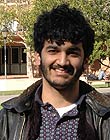UC Berkeley Point of View
Have the elections in Iraq changed your opinions about the Iraq war?
| A thousand points of view Check out the Point of View archive, with opinions on the presidential election, the Free Speech Movement, and more. |
BERKELEY – The first competitive national elections in decades were held in Iraq on Sunday, January 30, and pictures of jubilant Iraqi voters were on every front page and evening news broadcast. We asked a sampling of Berkeley students whether their feelings about America's role in the war had shifted at all in response to the news, and if so, how.
We invite other Berkeley students, faculty, and staff to share their points of view with the campus community. We will update this page with a selection of the most thoughtful e-mail submissions over the next several days. (Jump to submissions.) Please limit your response to no more than 200 words; include your full name, year and major (or title and department); and send from your Berkeley e-mail account only, for verification purposes. (Note: We've gotten enough e-mails from alumni to persuade us that they should be allowed to participate as well.)
| 'Nothing has changed. I don't
think we should have gone into Iraq, and
I think we should get out while we still
can. There were like 25 parties running
for the same election, and just because
one faction won doesn't mean that the other
24 are going to cooperate. It doesn't make
any sense to me.' —Zuhair
Saadat, first-year student.
Hometown: Santa Clara, CA. |
 |
 |
'The elections haven't changed
my view of the war, although the coverage
of the elections on the news looks good,
seems positive. I heard that one-third of
the assembly will be women, and there was
a high turnout of female voters. Given the
history of women's rights in Iraq and the
Middle East, that's significant. They keep
saying the turnout was surprisingly high,
but I am not sure what expectations that
was based on, so I can't help but be skeptical
of what will happen.' —Josh Kienitz,
second-year Boalt Hall law student. Hometown:
Lima, OH. |
| 'No, it hasn't. I don't believe
the elections were set up in the most democratic
of manners. The process was aided by the
United States too much to be considered
truly independent Iraqi elections — you
know, by the people of Iraq, for the people
of Iraq.' —Simona
Langmaier, Haas MBA '06,
Hometown: Sacramento, CA. |
 |
 |
'I watch the news, but
I don't trust what they say anymore. I was
against the war, and it's a hard opinion
to change. I just don't know how W. [President
Bush] can sleep at night with all those
people on the front. I guess it's good that
the elections went well, but it would be
naive to think that will change the violence
over there at all.'
—Ryan Quinn,
fourth-year forestry major. Hometown: Fiddletown,
CA. |
| 'Well, I was one of the few
people who were for the war initially, but
then I had to revise my stance when it went
so badly. I think overall, the elections
are positive, and if this works out, great.
The pictures you see of people voting make
everyone sentimental, but what will be even
more depressing is if the hopes of all those
people risking their lives to go to the
booths don't get realized. Although maybe
I am not as cynical as other people on campus,
I am still worried.' —Yael
Livny, second-year Boalt
Hall law student.
Hometown: Berlin, Germany. |
 |
 |
'No, they haven't changed
my opinion. The reasons for going to war
in the first place were wrong, and I don't
think just having an election can justify
that. I have watched some of the news coverage,
mostly of Iraqi-Americans casting their
absentee ballots here. They seem happy.
A while ago I read that it looked like the
U.S. was not pleased with the party that
would probably win most of the votes, and
I think that's just such a hypocritical
situation: we "give" them their freedom
and remove their dictator, but then they
have to elect someone we like.' —Justin Barton,
fifth-year anthropology major. Hometown:
Loas Banos, CA. |
Other opinions, via e-mail (in the order received)
| 'The elections do not
represent a real transfer of power to
the Iraqis. That is because polls in
Iraq show that the vast majority of
Iraqis view us as an occupying power.
And a country under foreign occupation
cannot be independent, by definition.
Likewise, elections run by an occupying
power cannot be legitimate.
We should
pay Iraq reparations for having destroyed
their country over the past two decades:
first by supporting Saddam Hussein
in the 1980s; then by destroying their
infrastructure during the first Gulf
War and through the sanctions imposed
in the 1990s, along with periodic bombing;
and finally by the invasion, which
is estimated to have killed 100,000
Iraqis.' —Daniel
Cohen,
fourth-year electrical engineering
and computer science major. |
| 'I was initially dead-set
against the war (and mostly still am),
but it’s hard to argue that we haven’t
seen some positive changes as a result
of it. For example: while I believe we
should not have invaded in the first place,
I think it’s great that Saddam
Hussein is no longer in power. I think
the reason that Bush was pushing so
adamantly for these elections and not
paying mind to calls for postponement
is that he wants to show the American
people definitive proof of significant
progress in Iraq. But hastily implemented elections are simply an easy-to-televise display of democracy; the real democracy will have to show itself through the actions of its government. To answer the question, these elections have not changed my opinion of the war, but the enhancement of life in Iraq and the improvement of world opinion regarding the U.S., should they manifest themselves, could change my view.' —Chris Varesi,
English '04.
Orange County, CA. |
| 'No, my opinion has not
changed. I was against invading Iraq from
the beginning. The fact that they have now had an election has not changed my opinion. The election occurred only because of U.S. intervention. Otherwise it would not have happened. Sadly, once we leave, Iraq will be the new hotbed of Islamic fundamentalist terrorism.' —I. Sanchez,
endocrinology Ph.D '92. |
| 'To this alum, Berkeley
students seem so remarkably brainwashed.
Even a cursory reading of student
reactions to the recent Iraqi election
reveals a lack of serious thought
on the part of most these students,
including, shockingly, some graduate
students who should be developing
a sense of independent thinking.
You can almost visualize them droning
to your reporter exactly on cue:"No,
the election didn't change anything
.... The evil Americans are forcing
the Iraqi citizens to vote for
a particular party ... We put Saddam
in power, and kept him there ...
George Bush is a murderer" and
so on. Far too many of America's young people have grown fat and happy, and they know that every spring and fall, they are able to bike over to the local elementary school, and cast their votes. Unfortunately, many of these students will actually fail to exercise their democratic right, which as we see now is not easily won. Of course the elections in Iraq were a monumental event. Watching the elation on the faces of Iraqi voters is real, direct evidence these students should consider when debating the value of our presence in Iraq. Freedom, like so many other things in life, is difficult to attain. But as the saying goes, nothing in life worth doing is easy! Wake up, Berkeley!!' —James
Alpert, BS Engineering
'04. |
| 'The Iraq elections
came with a tremendous propaganda
barrage unleashed by the corporate
media. Nothing has changed. American
soldiers are still being killed;
the Sunnis won't let power go without
a fight; civilians are being killed
by both sides. All I hear, is the
insurgents will be finished shortly.
(Peace is just around the corner.)
The big winner is Iran: we have
removed Iran's arch enemy and created
a vacuum they are more than happy
to fill. We have created conditions
for training grounds of new terrorists
to hone the skills of killing.
Now, with the Shiites receiving
the majority of the vote, an
Islamic constitution may be around
the corner. When we as amateurs in reference to the age of these conflicts come with simplistic religious views of the world and try to intervene in complex political tribal and volatile religious areas, more wars and civil wars will follow. And nothing is said about the 13 permanent bases the U.S. is building — a recipe for future confrontation. Lies, deceit, propaganda galore. No! Nothing has really changed to make me change my mind, unfortunately.' —John
Gorbunoff,
Night Pressroom Supervisor,
UC Printing Services |
| 'I don't believe
that the Iraqis even had a election,
and as educated people, we shouldn't
refer to our current situation
as a "war" — because
it hasn't been one since Day One.
We have lost more then 1,500 troops
in our offensive against
Iraq, and no one, even at our progressive
[university] seems to care that
we are essentially committing genocide
on those fighting against the destruction
of their nearly crippled culture.
The fact is, as long as the
United States or any other armed
occupying force is present in
iraq, the bloodshed will only increase
on an increasing scale. We as a
society need to wake up.' —Albert
Lae Mou,
legal studies/Chinese
major. Hometown:
New York City and Taipei. |
| 'The tree
of liberty must be refreshed
from time to time with the blood
of
patriots and tyrants. It is its
natural
manure.—Thomas Jefferson,
1787 Nothing in life is free, and I am afraid that those who oppose this war forget this. This is how I have felt about the war in Iraq all along, and this is how I feel now. —Bill
Principe, zoology '74.
Hometown: La Cañada, CA. |
| 'Nothing has changed.
In fact, the elections have even
lowered my opinion of the current
administration (and half the American
people). The reasons for invading
Iraq have shifted from non-existent
WMDs to liberating the people from
Saddam, and if the U.S. is really
so keen on its moral mission
to free people from such evil and
oppressive regimes, it should
take the war further and attack
the other 100 or so countries
where there is no full democracy.
It is almost comical to see the U.S. administration trying to promote their propaganda about the Iraqi election (and the Americans buying into it, too). Journalists in Baghdad were limited to only five polling stations, and only one of these was not in a Shi'a area. Ninety percent of Sunnis were expected to not have participated. A high 72 percent turnout was hastily announced, which was later withdrawn and then a 60 percent figure was provided two days later. However, even if this statistic is accurate, only 8 million out of 14 million Iraqis bothered to register for the election, bringing the percentage down to 30 percent. Out of 1.2 million Iraqi exiles, only 280,000 registered to vote. Nor would high Iraqi participation in this election lend legitimacy to the occupation, as the administration has tried to suggest. Most Iraqis believe that forming a National Assembly will bring an end to the U.S. occupation, and that is the real reason many of them are voting.' —Haywood
Hiu Yat Ho, EECS '03.
Hometown: Hong Kong. |
